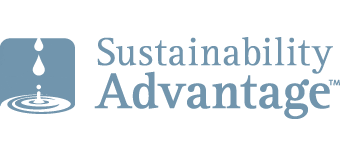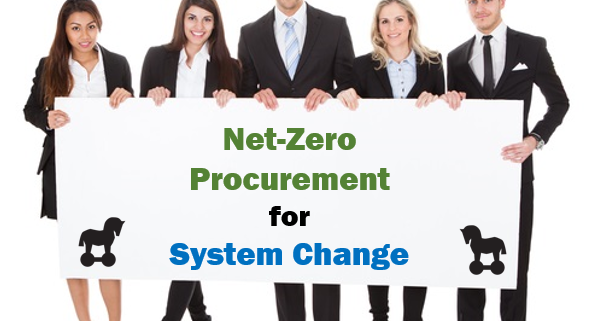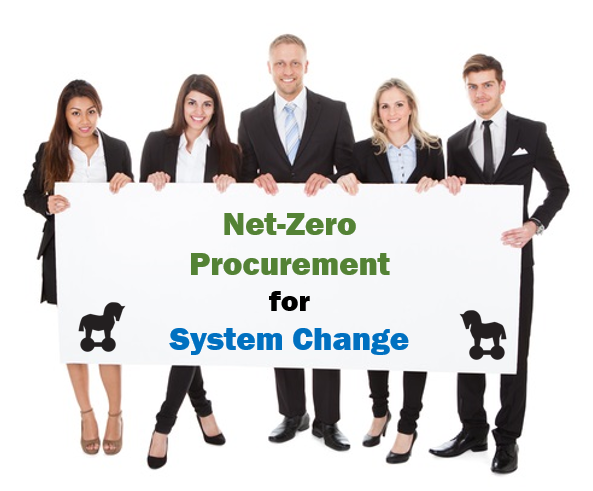5 Reasons Net-Zero Procurement Can Achieve System Change
Greta Thunberg coined the sign-worthy call to action: “System Change, Not Climate Change.” Good idea. But how can we transform the system that has brought us to this precipitous climate emergency? We’ve been unsuccessfully inching our way toward system change for years, mostly on the margins. There are five reasons that Net-Zero Procurement is a force for system change that can succeed.
The desired system
First, let’s agree on the system that we aspire to have. It’s a system that favors organizations whose purpose is to improve the long-term wellbeing of all stakeholders, including communities and nature, on our finite planet. Companies will have value propositions grounded in the provision of sustainable goods and services. The system will act in the best interests of society as a whole, and operate in symbiosis with Earth’s natural systems. It will embody the blueprint for peace and prosperity as essentially defined by the United Nation’s Sustainable Development Goals (SDGs).
In the desired system, well-managed companies will thrive financially because they buy, produce and sell in a manner that has a positive net impact on both the natural environment and society. The new system will be circular ‒ it will repurpose or recycle what is currently discarded in landfills or allowed to pollute nature. Most significantly, the system will be powered by renewable energy, not fossil fuels.
Net-Zero Procurement
“Net-Zero Procurement” is a focused subset of sustainable procurement. Sustainable procurement is defined as procurement that ensures buyers obtain the best value for money when purchasing the most sustainable goods and services from the most sustainable suppliers, in support of the buyer’s stated organizational purpose and strategic goals. Sustainable procurement heavily weights the sustainability attributes of the proposed goods and services when assessing their quality, as well as the sustainability performance of suppliers’ enterprises while providing those goods and services. It intentionally gives preferential treatment to the most sustainable suppliers who offer the most sustainable products.
This is in contrast to the current system of the tyranny of the lowest price which too often undermines and negates sustainability-oriented investments. A buying organization’s investments in sustainability can be rendered void by continuous purchase investments in business-as-usual goods and services. In RFPs today, sustainability attributes of products and / or suppliers might be given 2-3% weight, which is little more than a check mark. It’s time we leveraged the invisible hand of the market to signal that sustainability matters.
Net-Zero Procurement focuses on suppliers’ sustainability and their efforts to address climate change. It gives significant weight (at least 10%) to suppliers’ verified scores on their greenhouse gas (GHG) reduction plans and actions, as well as significant additional weight (at least another 10%) to suppliers’ overall sustainability performance scores. That is, buyers give preferential treatment to suppliers transitioning toward decarbonized, sustainable business models, which leads to the first reason that Net-Zero Procurement will gain traction.
Reason 1: Net-Zero Procurement takes action on the high-profile climate crisis
The Intergovernmental Panel on Climate Change (IPCC) has unequivocally warned that the average global temperature is already 1.1˚C above pre-industrial levels, and that we are on track to be at 1.5˚C by 2030 and over at 3˚C by 2100. A temperature rise above 1.5˚C is an existential threat to human civilization … and to economies. The World Economic Forum has declared that “Climate action failure” and “Extreme weather” are the two biggest threats to world economies in the next ten years. The Task Force on Climate-Related Financial Disclosures (TCFD) confirmed that bankers and investors are concerned about the potential impact of climate change on companies’ financial wellbeing. It is in the self-interest of the business community to decarbonize our economy ‒ it’s bad for business to be at risk from climate change.
Yet only a third of the more than 13,000 global companies surveyed by CDP have credible GHG emissions-reduction targets, and fewer than 10% have science-based GHG reduction targets. GHG emissions generated in a company’s supply chain (i.e., Scope 3 GHGs) are, on average, 11.4 times greater than in companies’ direct operations. When asked why he robbed banks, Willie Sutton famously replied, “Because that’s where the money is.” Similarly, buyers focus on reducing their supply chains’ GHG emissions because that’s where most of their emissions are. The World Economic Forum estimates that nearly all companies can reduce their carbon emission by one-third at no additional cost, while some companies can decarbonize at net-zero cost. The lowest cost tonne of carbon that any organization can remove is in their supply chains.
Net-Zero Procurement incentivizes supplier GHG reductions by favoring companies that have committed to the science-based Net-Zero Standard. It also triggers existing suppliers to reduce their GHG emissions, to position themselves well for their next bid or the buyer’s next review of its most-favored supplier list. That is, preferred suppliers boldly commit to reduce their GHG emissions by 50% by 2030, and by 100% by 2050. They follow up their commitment with concrete, measurable actions. Why? Because it is in their self-interest to help fix climate change, and because their customer / buyer will give them preferential treatment if they do more than their competitors, which leads to the second reason.
Reason 2: Net-Zero Procurement is a Trojan Horse market force
Companies today typically respond better to market forces than to new regulations. Net-Zero Procurement is a market force. Businesses exist to delight their customers. If something matters to customers, it matters to their suppliers. By heavily weighting supplier scores on overall sustainability and GHG reductions, the buyer sends a strong market signal that addressing climate change matters. Weightings in the bid appraisal process are an essential feature of Net-Zero Procurement. Suppliers will want to improve their weighted scores so that they will be more attractive to buyers than their competitors.
That is, the customer’s buying power is a powerful, follow-the-money Trojan Horse market force within the current system. It accelerates and mobilizes suppliers’ voluntary self-serving drive to reach net-zero GHGs. In turn, their net-zero business model positions them to thrive in a decarbonized economic system that favors sustainable goods and services produced by sustainable organizations.
Reason 3: Net-Zero Procurement expedites a market for sustainable products
Net-Zero Procurement quick-starts sustainable procurement. As defined above, sustainable procurement ensures that buyers obtain the best value for money when purchasing the most sustainable goods and services from the most sustainable suppliers. Net-Zero Procurement starts with the “most sustainable supplier” aspect because suppliers are the source of extensive Scope 3 GHG emissions. Supplier sustainability assessment is a relatively fast and easy dimension of sustainable procurement to implement. Buyers simply ask suppliers to disclose their performance on core sustainability issues, especially their performance on GHG reductions.
Supplier sustainability assessment is a significant step in the implementation of sustainable procurement. It can be done before, or in parallel with, the more challenging inclusion of sustainability specifications and credible ecolabel requirements in Requests for Proposals (RFPs) for priority goods and services. When the supplier-related aspect of sustainable procurement is implemented, the product-related aspect will quickly follow. Net-Zero Procurement expedites buyers’ giving significant weight to the sustainability-related specifications of procured goods and services, thereby creating a market in which sustainable products have a competitive advantage.
Reason 4: Net-Zero Procurement quick-starts sustainable business models
According to the 2020 Gartner Sustainability Survey, 63% of global respondents reported customers / buyers as the top stakeholder group creating pressure for sustainability, followed by investors (48%) and regulators (46%). When buyers ask suppliers to disclose their performance on core sustainability issues, they quick-start suppliers’ journey toward more resilient, sustainable business models. Suppliers can have a third-party do the sustainability assessment for them, or buyers can ask suppliers to complete a standard questionnaire. Using the same questionnaire with all suppliers facilitates comparison of bidders’ responses. If buyers don’t already have a suitable supplier sustainability assessment system, they can use the freely available, open-source Basic Sustainability Assessment Tool (BSAT). It uses only 20 multiple-choice questions to score supplier performance on all core sustainability issues, including on GHG emission reduction efforts. BSAT expresses all scores as percentages, enabling simple calculation of a supplier’s share of the weight assigned to key criteria, like GHG reductions.
A sustainability assessment questionnaire like BSAT, verified by a qualified third party, provides a diagnostic baseline assessment of company performance on the full spectrum of sustainability issues that impact the wellbeing of stakeholders. The climate emergency dictates that GHG reduction is a top priority – hence, Net-Zero Procurement. However, scores on other environment-, employee-, and community-related issues like biodiversity, waste, living wages, diversity / equity / inclusion (DEI), etc. may be revealing and may warrant action, particularly if the organization has goals in those areas. Third-party validation of the answers can also be educational for supplier management. Buyers may assess their own sustainability performance using the same tool, to walk-the-talk on what they are asking suppliers to do. Analysis by buyers of supplier responses may reveal opportunities where customers can collaborate with their suppliers on common sustainability-related challenges. This teamwork accelerates the journey toward sustainable business models for all organizations, triggered by the supplier assessment facet of Net-Zero Procurement.
Reason 5: Net-Zero Procurement scales globally
Climate change is a global issue. Procurement is a ubiquitous business function ‒ all organizations, public and private, procure goods and services from their supply chains. Net-Zero Procurement is an instant, massive market force multiplier. It can be implemented by any-size organization, in any industry sector, anywhere, anytime – there is no need to sequence its adaptation. Its adoption can be organic and viral.
Net-Zero Procurement will be especially attractive to governments. It can be implemented by any level of government – municipal, state / provincial, or federal – with existing budget dollars. Most companies have watched from the sidelines as national governments gather at Conferences of the Parties (COPs) and pledge to fix climate change for them. After 26 ineffective COPs, it’s clear that national governments need to engage businesses in the race to net-zero or their pledges will not be met. Net-Zero Procurement facilitates business community engagement. Plus, Net-Zero Procurement allows a government to wear its customer hat instead of its mandator hat. Instead of using their regulatory power, governments can use their trillions of dollars of global buying power to work collaboratively with business in their mutual race to net-zero GHGs.
The best efforts of NGOs have not been able to transform the system, at least not pervasively and fast enough. They are marginalized by many corporations as being outside the system. We can use Net-Zero Procurement to motivate businesses to transform their system from within, improving their products while simultaneously making their low-carbon business models more resilient, for the benefit of themselves and society as a whole. These benefits are direct by-products of Net-Zero Procurement.
Net-Zero Procurement can be the Trojan Horse inside our capitalist system, using capitalism’s own market forces to drive the total transformation and decarbonization of our economic system. This is not just a nice thing to do. It is now the only way to leverage change at the scale required, in time.
Please feel free to add your comments and questions using the “Leave a reply” comment box under the “Share this entry” social media symbols, below. For email subscribers, please click here to visit my site and provide feedback.






Comments are closed.